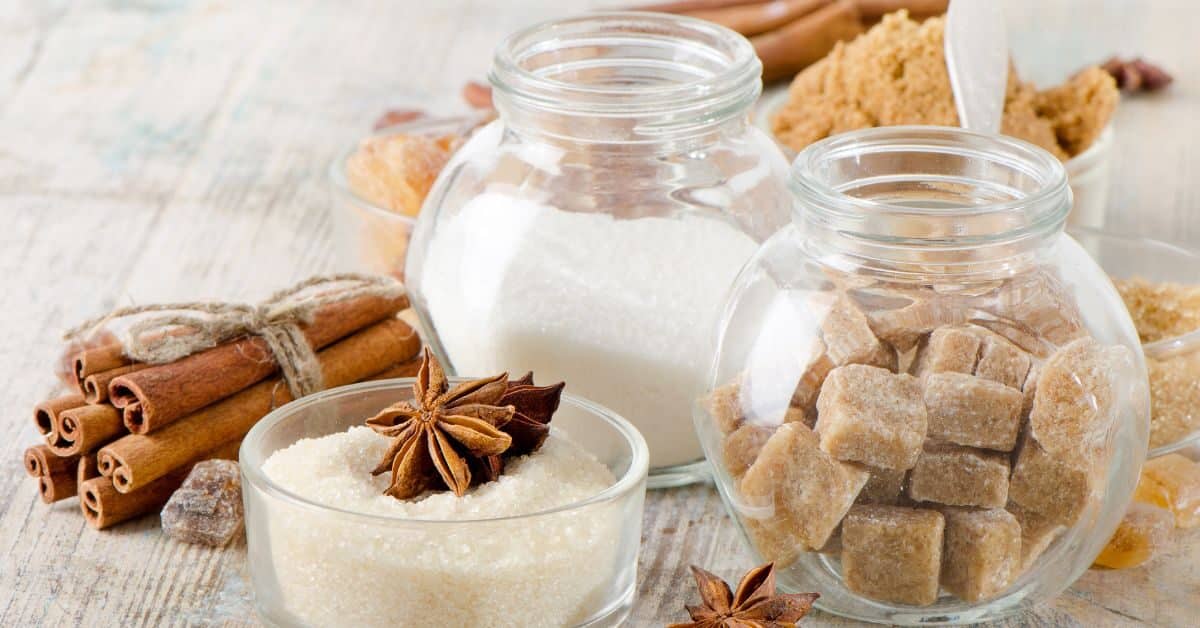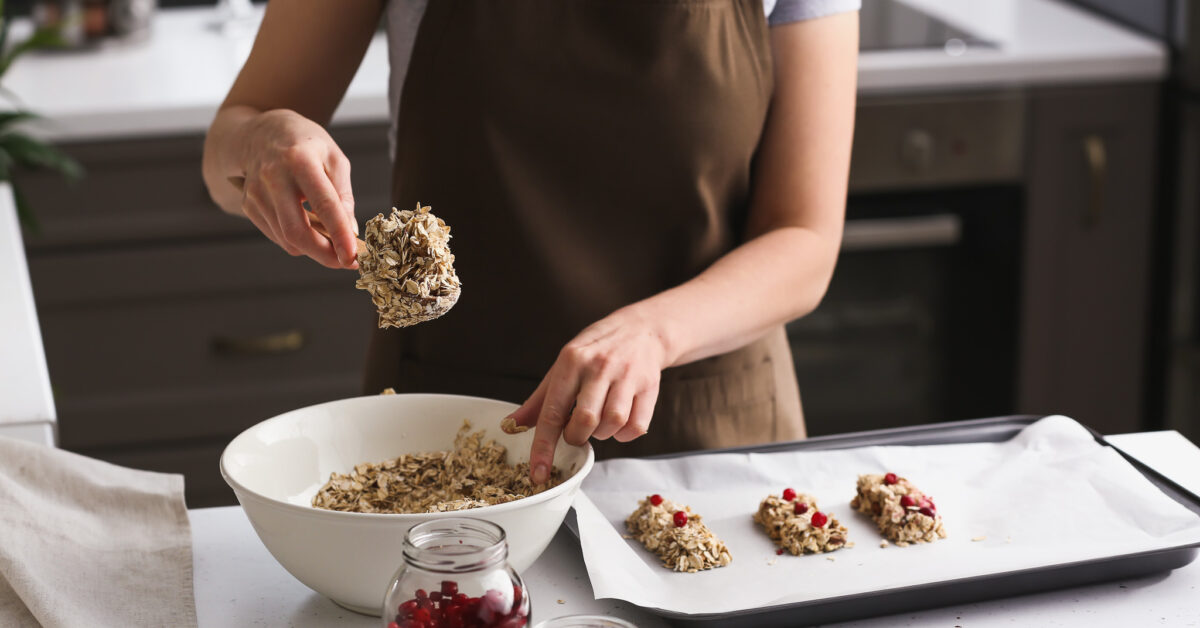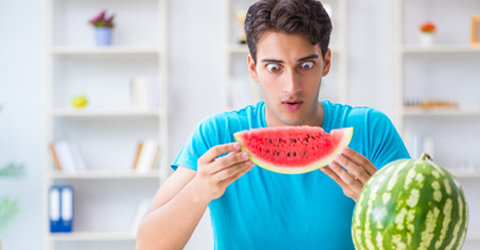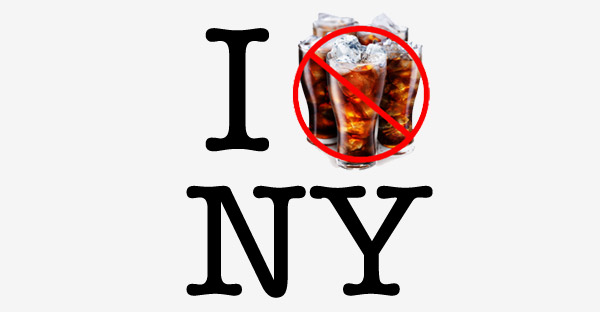
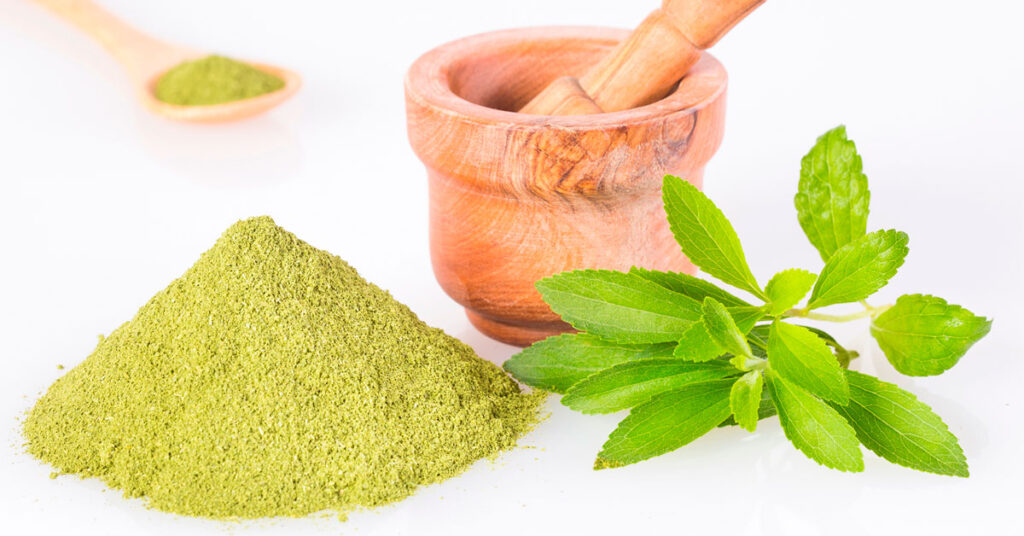
Because it contains no calories and is derived from a natural source, stevia is often marketed as a healthier alternative to sugar and artificial sweeteners. Use of stevia in commercial products grew 31% between 2017 and 2018,[1] and the global market for the sweetener reached a value of $590 million in 2020.[2]
Stevia now appears as a sugar replacement in everything from beverages to bread and is also sold as a non-caloric sweetener under brand names like Truvia and PureVia. But is it really a safe substitute for sugar? If so, does it have a place in a plant-based diet?
How Stevia Is Made
Technically, stevia could be called “plant-based.” The sweetener is extracted from Stevia rebaudiana, a plant in the same family as chrysanthemums and, believe it or not, ragweed.[3] Its leaves contain sweet compounds called glycosides, which are typically extracted using one of two methods:
Soaking the leaves in hot water, filtering the liquid, and crystalizing the compounds into dry sweetener.
Using microorganisms to carry out a conversion reaction, referred to as bioconversion, which can create sweeter compounds.[4]
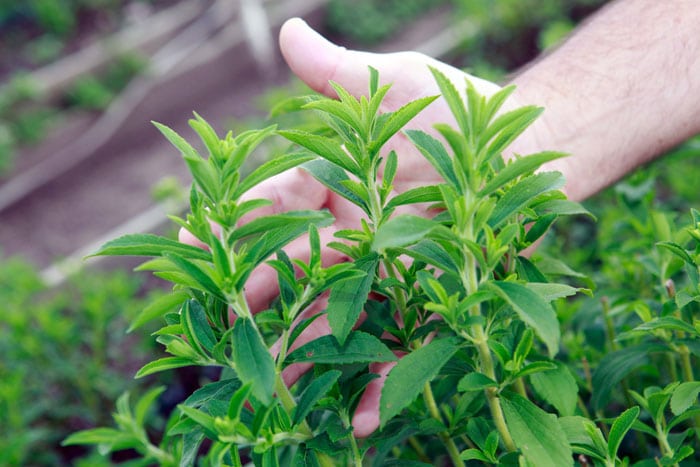
Most commercial stevia sweeteners are made using hot water extraction, a process that can involve as many as 40 steps.[5] Bioconversion is more often used to produce less common glycosides that are just beginning to appear in mainstream products.
Depending on the type of glycoside, the resulting extract can be anywhere from 100 to 300 times sweeter than sugar. Pure stevia extract has no fillers or preservatives and a negligible caloric content. Commercial sweeteners made from stevia may contain additional ingredients, including sugar alcohols and dextrose.
The FDA has declared purified forms of stevia, listed on products as stevia extract or Reb A, to be “generally recognized as safe” (GRAS), and there is some evidence to suggest consuming stevia glycosides may have favorable effects.[6]
Most commercial stevia sweeteners are made using hot water extraction, a process that can involve as many as 40 steps.[5]
Potential Benefits of Stevia
When used as a functional or therapeutic ingredient, stevia may:
- Reduce appetite and aid in weight control.[7]
- Increase insulin response, resulting in lower blood glucose levels after eating,[8] although other research suggests the sweetener may only delay and not prevent a rise in blood sugar.[9]
- Reduce inflammation by interfering with inflammatory signaling pathways,[10] resulting in lower levels of inflammatory markers like interleukin-6 (IL-6) and tumor necrosis factor-alpha (TNF-ɑ).
- Help reduce LDL oxidation, which in turn can lower the risk of atherosclerosis,[11,-12] which may be due to antioxidants present in stevia.[13]
It’s important to note many of these studies were conducted using stevia glycosides, not commercial stevia sweeteners, which may carry their own risks.
Stevia Drawbacks and Dangers
The FDA didn’t grant stevia GRAS status until 2008; the sweetener had previously been banned from being marketed in 1987 and refused approval in 1991. Although an acceptable daily intake has been set at 4 milligrams per kilogram (about 270 milligrams for a 150 lb person), questions regarding stevia’s safety remain.
One major concern in light of the current obesity epidemic is evidence suggesting that consuming non-caloric sweeteners like stevia in place of sugar could lead to higher caloric intake at subsequent meals.[14] The body appears to “make up for” the calories it expected to receive from sugar, negating any expected difference in caloric intake.
Other potential dangers include:
- DNA mutations.[15]
- Nerve cell toxicity.[16]
- Hormone disruption.[17]
- Interference with gut bacteria communication and balance.[18]
More research is needed to determine the extent and severity of these risks.
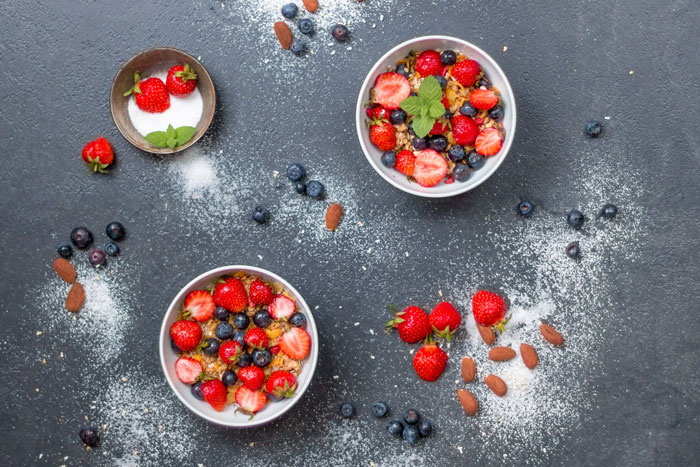
What About Stevia Side Effects?
Some people experience bloating, nausea, dizziness, muscle pain, and/or numbness[19] when they eat stevia. It may also prompt a reaction in people who are allergic to plants in the ragweed family.
Stevia may cause unsafe reductions in blood pressure in people taking blood pressure medications, and consuming the sweetener in excess of acceptable levels during pregnancy can result in complications.
Other side effects, including digestive discomfort, may result from the ingredients added to stevia sweeteners rather than from stevia itself.
Whole Food Sweetener Alternatives to Stevia
Due to these potential issues with stevia—and the fact that many stevia products are highly processed—the sweetener isn’t recommended as part of a whole food, plant-based diet.
But you can still enjoy plenty of natural sweet treats! Try these tasty sugar replacements in your baked goods and snacks:
- Dates or date pate
- Date sugar (made from ground dried dates)
- Pureed fruit, such as bananas
- Sweet potato
Small amounts of maple syrup or blackstrap molasses also appear in some whole food, plant-based recipes and can be acceptable for occasional use.
To satisfy your sweet tooth every day, you can’t go wrong with fruit. The sugars in fresh, frozen, and dried fruits don’t need to be extracted or processed and are generally well-tolerated by most people. So, instead of reaching for stevia as a sugar substitute, try tossing some raisins in your oatmeal, grabbing an apple for a snack, or adding some berries to your lunchtime salad.
References
- Siegner, C. “Stevia-sweetened product launches jumped 31% last year.” Food Dive. May 30, 2019. https://www.fooddive.com/news/stevia-sweetened-product-launches-jumped-31-last-year/555756/.
- “Global stevia market report 2021: Market reached a value of $590 million in 2020 – Industry trends, share, size, growth, opportunity, and forecast 2021-2026 – ResearchAndMarkets.com.” Business Wire. June 09, 2021. https://www.businesswire.com/news/home/20210609005434/en/Global-Stevia-Market-Report-2021-Market-Reached-a-Value-of-590-Million-in-2020—Industry-Trends-Share-Size-Growth-Opportunity-and-Forecast-2021-2026—ResearchAndMarkets.com.
- McDermott, A. “Everything you need to know about stevia.” Healthline. March 02, 2020. https://www.healthline.com/health/food-nutrition/stevia-side-effects.
- “Everything you need to know about stevia sweeteners.” Food Insight. May 26, 2021. https://foodinsight.org/everything-you-need-to-know-about-stevia-sweeteners/.
- “Stevia: Health benefits, facts, and safety.” Medical News Today. https://www.medicalnewstoday.com/articles/287251#what_is_stevia.
- “Stevia: Health benefits and risks.” WebMD. https://www.webmd.com/food-recipes/what-is-stevia.
- Farhat, G., Berset, V., & Moore, L. “Effects of stevia extract on postprandial glucose response, satiety, and energy intake: A three-arm crossover trial.” Nutrients 11, no. 12 (2019): 3036. doi:10.3390/nu11123036.
- Samuel, P., Ayoob, K. T., Magnuson, B. A. Wölwer-Rieck, U., Jeppesen, P. B., Rogers, P. J. et al. “Stevia leaf to stevia sweetener: Exploring its science, benefits, and future potential.” The Journal of Nutrition 148, no. 7 (2018). doi:10.1093/jn/nxy102.
- Tey, S. L., Salleh, N. B., Henry, J., & Forde, C. G. “Effects of aspartame-, monk fruit-, stevia- and sucrose-sweetened beverages on postprandial glucose, insulin, and energy intake.” International Journal of Obesity 41, no. 3 (2016): 450–457. doi:10.1038/ijo.2016.225.
- Boonkaewwan, C., Toskulkao, C., & Vongsakul, M. “Anti-inflammatory and immunomodulatory activities of stevioside and its metabolite steviol on THP-1 cells.” Journal of Agricultural and Food Chemistry 54, no. 3 (2006): 785–789. doi:10.1021/jf0523465.
- Ray, J., Kumar, S., Laor, D., Shereen, N. Nwamaghinna, F., Thomson, A., et al. “Effects of Stevia rebaudiana on glucose homeostasis, blood pressure, and inflammation: A critical review of past and current research evidence.” International Journal of Clinical Research & Trials 5, no. 1 (2020). doi:10.15344/2456-8007/2020/142.
- Geeraert, B., Crombé, F., Hulsmans, M., Benhabilès, N., Geuns, J. M., & Holvoet P. “Stevioside inhibits atherosclerosis by improving insulin signaling and antioxidant defense in obese insulin-resistant mice.” International Journal of Obesity 34, no. 3 (2009): 569–577. doi:10.1038/ijo.2009.261.
- Ameer, K., Jiang, G-H., Amir, R. M., & Eun. J-B. “Antioxidant potential of Stevia rebaudiana (Bertoni).” Pathology, 2020, 345–356. doi:10.1016/b978-0-12-815972-9.00033-0.
- Greger, M. “Artificial sweetener side effects: Why Splenda & stevia can make you gain weight.” Food Revolution Network. December 17, 2020. https://foodrevolution.org/blog/artificial-sweetener-side-effects/.
- Kobylewski, S., & Eckhert, C. D.”Toxicology of rebaudioside A: A review” PDF File. https://cspinet.org/sites/default/files/attachment/stevia-report_final-8-14-08.pdf.
- Villareal, L. M. A., Cruz, R. A. M., Ples, M. B., & Vitor, R. J. S. “Neurotropic effects of aspartame, stevia, and sucralose on memory retention and on the histology of the hippocampus of the ICR mice (Mus musculus).” Asian Pacific Journal of Tropical Biomedicine 6, no. 2 (2016): 114–118. doi:10.1016/j.apjtb.2015.11.001.
- “Stevia side effects: What you need to know.” Medical News Today. https://www.medicalnewstoday.com/articles/319837#risks-and-side-effects.
- Markus, V., Share, O., Teralı, K., Ozer, N., Marks, R. S., Kushmaro, A., et al. “Anti-quorum sensing activity of stevia extract, stevioside, rebaudioside A, and their aglycon steviol.” Molecules 25, no. 22 (2020): 5480. doi:10.3390/molecules25225480.
- “Stevia.” WebMD. https://www.webmd.com/vitamins/ai/ingredientmono-682/stevia.
Copyright 2026 Center for Nutrition Studies. All rights reserved.
Deepen Your Knowledge With Our
Plant-Based Nutrition
Certificate
Plant-Based Nutrition Certificate
- 23,000+ students
- 100% online, learn at your own pace
- No prerequisites
- Continuing education credits


